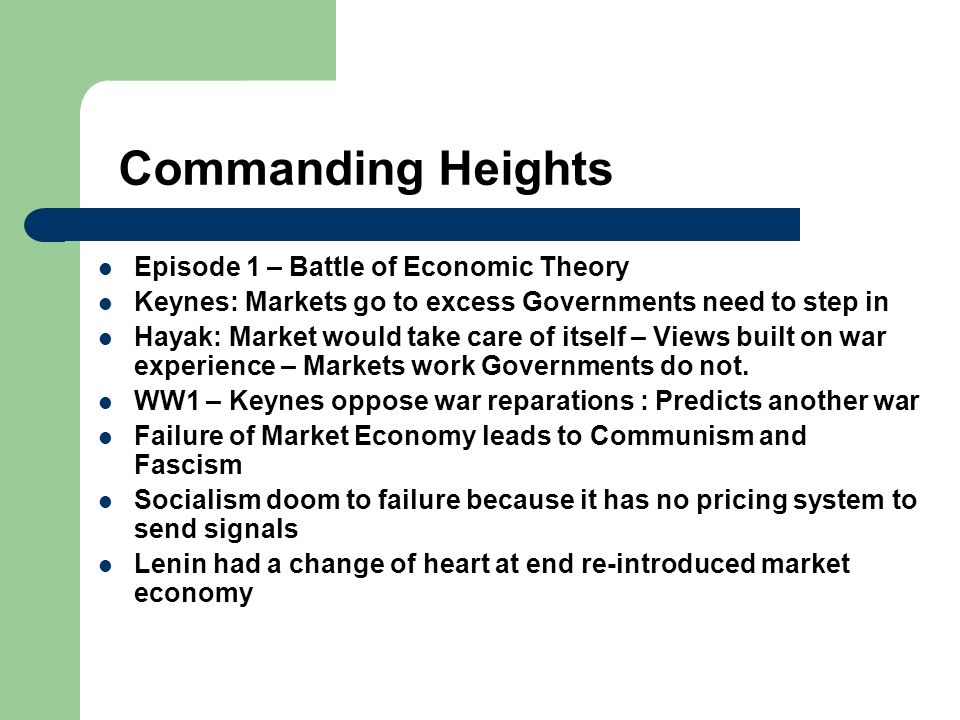

Commanding heights episode 3 summary free#
The robber barons were often condemned in the press, but the United States had much more commitment to industrialization and free markets than did other countries in the late 19th and the early 20th centuries. (In the case of industrialized countries, they often begin before the war.) Admitting that the book cannot touch on every single aspect (Yergin remarks that the topic of their book constitutes an entire new academic discipline), the authors make many assertions. In the book, the authors examine briefly many different nations and regions and their economic development since World War II. Few people would die with the words "free markets" on their lips. Their idealized vision of Soviet communism, however misguided, provided justification for their ultimate sacrifice. In the Spanish Civil War in the late 1930s, Republican soldiers are said to have died with the word "Stalin" on their lips. Yet a system that takes the pursuit of self-interest and profit as its guiding light does not necessarily satisfy the yearning in the human soul for belief and some higher meaning beyond materialism. It is based upon contracts, rules, and choice-in short, on self-restraint-which contrasts mightily with other ways of organizing economic activity. The market also requires something else: legitimacy. The authors place so much emphasis on narrowing economic gaps because they believe, contrary to many of the people who are interviewed, that there is no ideological support for capitalism, only the pragmatic fact that the system works better than any other, as they remark: More specifically, they believe that if inequality in economic growth remains high and if Third World nations are not offered the proper opportunities and incentives to support capitalism, the movement will end just as the first era did. While strongly in favor of this trend, the authors worry that globalization will not last. Since then, they assert countries embracing free markets have prospered on the whole, and those adhering to central planning have failed. While Thatcher, Reagan, and their successors made sweeping reforms, the authors argue that the current era of globalization finally began around 1991, with the collapse of the Soviet Union. Friedman's monetarism was also abandoned in practice as government-issued debt as a percentage of GDP rose dramatically throughout the 1980s. In contrast to Hayek's ideas, Reagan's policies also continued and expanded tax write-offs, rebates and subsidies for many large corporations. In practice, Hayek's policies were applied only selectively, as Reagan's 1986 income tax reforms substantially increased taxes on the lowest quintile of wage-earners but dramatically decreased rates for the upper two quintiles. Both leaders parted ways with Keynesian economics and governed more in the tradition of the works of Friedrich Hayek, who opposed government regulation, tariffs, and other infringements on a pure free market and those of Milton Friedman, who emphasized the futility of using inflationary monetary policies to influence rates of economic growth. The old trend changed when Margaret Thatcher became Prime Minister of the United Kingdom and when Ronald Reagan was elected President of the United States. The authors then discuss how the political changes of the 1980s ushered in accompanying changes in economic policy.

The authors consider that the so-called commanding heights were often owned or severely regulated by governments in accordance with Keynes' ideas. Keynes believed in government regulation of the economy, which the authors underline as Keynes' great influence and prestige. According to the authors, the rise of communism and fascism, not to mention the Great Depression, nearly extinguished capitalism, which rapidly lost popularity.Īfter World War II, the authors note that the work of economist John Maynard Keynes came to be widely accepted in Western economies.

Overall, they see globalization as a positive movement that improves the standard of living for all the people connected to it, from the richest to the poorest. The authors define globalization as periods in which free markets predominate and countries place few, if any, limits on exports, immigration, imports, or information exchanges. The authors take the thesis that prior to World War I, the world effectively lived in a state of globalization, which they term the First Era of Globalization.


 0 kommentar(er)
0 kommentar(er)
